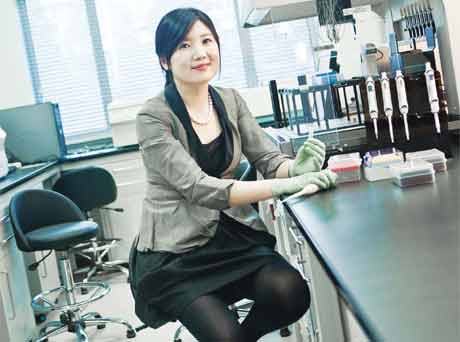Answers in the genes
Updated: 2011-01-28 12:38
By Shen Jingting (China Daily European Weekly)
|
|
Hopes ride on benefits of increasing awareness of genetic tests
Several evenings a week, Google co-founder Sergey Brin changes into swimming trunks, steps onto a 3-meter springboard, looks at the water below, and dives.
A test had revealed disturbing news for Brin. After a DNA test with 23andMe, an Internet genome-screening company run by his wife, Brin knew he carried a genetic mutation linked to Parkinson's disease.
Working out may be one way to help lower the propensity to develop Parkinson's disease and Brin knew it.
Brin is just one of a growing number of people who are becoming aware of genetic tests, says Zhou Huijun, chief executive officer of Silicon Valley-established iDNA Inc.
The awareness is also growing in developing countries like China, Zhou says.
Zhou and her husband, who are both Cornell University PhDs, were themselves found to be carrying a strange gene that pushes them to become workaholics.
"Our children inherit that gene. Usually when children have the gene, they are more likely to be obsessed with video games," Zhou says.
So she made up her mind to prevent her children from playing computer games and encouraged them to exercise instead.
"Just like Brin, our behaviors changed after genetic tests," Zhou says.
But genetic scans may bring more benefits. For example, parents can "educate" children according to their "genuine capabilities" - certain children are born to run fast and other children may be musically talented.
Gene tests can also address issues such as likely responses to drugs and medical treatment.
Since the Human Genome Project public consortium announced in 2000 that the genetic blueprint for a human being was being drafted, the genetic testing industry has been developing fast.
In 2008, Time magazine selected the retail DNA test as the Best Innovation of the year. Companies such as 23andMe, Navigencis, DNA direct and deCODE have offered affordable direct-to-customer gene services to people.
Zhou Huijun established China's first online genetic testing platform www.iDNA.com.cn in 2008. Before that, she conducted post-doctoral research on clinical molecular genetics at Stanford University.
She worked for global gene technology companies Incyte and DNA direct from 1998 to 2008, but still moved to China to start her own business.
She called her website iDNA because she wanted people to be able to buy and download personal genetic reports from an iDNA platform.
"Just like how they download music and applications from Apple's iTunes," she says.
IDNA provides various genetic tests for different targeted clients. The most popular tests include lactose intolerance and drug-use safety scans for newborns. The prices range from 300 yuan (33 euros) to 30,000 yuan for every test.
A gene scan is simple and painless. Customers log onto the website and buy genetic testing services online. iDNA will send an express delivery package to collect their saliva samples by using cotton swabs. Personal reports are available online within 48 hours.
"In China, the genetic testing market is almost a brand-new area where competitors are few," Zhou says. She estimates there are less than 10,000 Chinese people that received genetic tests. The number of qualified gene testing institutions in China is under 10, she says.
"The New York Times reported that in the following three to five years, more than half of Americans who receive junior middle school education or above will buy genetic testing products," Zhou says. "I hope a similar story will happen in China, too."
The global market for genetic testing is forecast to reach $1.8 billion (1.3 billion euros) by the year 2015, according to a report issued by Global Industry Analysts Inc, one of the world's largest market research publishers.
Increasing knowledge about the potential benefits in genetic testing has been one of the prime reasons for the growth of genetic testing, as well as burgeoning demand for molecular diagnostics.
Guo Fanli, pharmaceutical industry analyst with Shenzhen-based CIConsulting, says about 20 percent of Chinese people may know about or experience genetic testing in the next five to 10 years.
He says companies in the genetic testing field usually achieve a high gross profit rate.
"The China market may hold five to 10 gene enterprises that will each generate hundreds of millions of yuan annually, when the market is mature."
Zhou's iDNA Inc has received more than 10 million yuan of venture capital funds from various investors and companies, including Bayer China President Liam Condon and Poalim Capital Markets Group, Israel's leading investment bank.
The US personal genetics company 23andMe, co-funded by Anne Wojcicki, wife of Google co-founder Sergey Brin, has now raised nearly $54 million in funding to date.
However, the genetic testing market is not devoid of challenges. Factors such as gene discrimination and the level of authenticity engaged in screening remain questionable.
Chen Lu, a Beijing-based financial analyst, says it can also be scary that someone might insist on seeing a potential mate's DNA test before moving ahead in a relationship.
"I would be OK to share test results with my future husband, and I don't mind whether he wants to share or not," she says.
"Life is a gamble. Sometimes you have no choice, especially when you completely fall in love."
E-paper

Ear We Go
China and the world set to embrace the merciful, peaceful year of rabbit
Preview of the coming issue
Carrefour finds the going tough in China
Maid to Order
Specials

Mysteries written in blood
Historical records and Caucasian features of locals suggest link with Roman Empire.

Winning Charm
Coastal Yantai banks on little things that matter to grow

New rules to hit property market
The State Council launched a new round of measures to rein in property prices.

